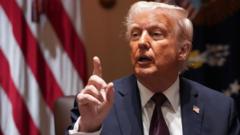President Trump's announcement of a 25% tariff on cars and parts imported into the U.S. has alarmed trading partners and led to a downturn in international stock markets, signaling the potential for retaliatory measures and escalating trade tensions.**
Trade Tensions Rise as Trump Implements New Car Tariffs**

Trade Tensions Rise as Trump Implements New Car Tariffs**
Increasing tariffs on imported automobiles threaten to trigger a global trade war with significant repercussions for the automotive industry.**
The global automotive landscape is bracing for impact as President Donald Trump announces a striking 25 percent tariff on cars and auto parts imported into the United States, effective April 3. This significant move has sent shockwaves throughout the car industry, leading to declines in stock prices across major markets in Asia, Europe, and the U.S.
In response to the proposed tariffs, which are primarily directed at Mexico, Japan, South Korea, and Canada—countries responsible for about 75 percent of vehicle imports to the U.S.—global leaders and industry stakeholders are voicing their concerns. Notably, Canadian Prime Minister Mark Carney has declared that the U.S. is "no longer a reliable partner," promising retaliatory measures next week. Meanwhile, German Economic Minister Robert Habeck emphasized the necessity for the EU to formulate a robust counter-response, asserting, "It must be clear that we will not back down."
Further complicating the situation, Trump escalated tensions by threatening additional tariffs if the EU and Canada respond collectively. Analysts now warn that such hostile exchanges increase the risk of a worldwide trade war, which could have alarming repercussions for the international economy.
As markets continue to react to these developments, stakeholders await further announcements on counter-tariffs and the subsequent fallout from this latest chapter in U.S. trade policy.
In response to the proposed tariffs, which are primarily directed at Mexico, Japan, South Korea, and Canada—countries responsible for about 75 percent of vehicle imports to the U.S.—global leaders and industry stakeholders are voicing their concerns. Notably, Canadian Prime Minister Mark Carney has declared that the U.S. is "no longer a reliable partner," promising retaliatory measures next week. Meanwhile, German Economic Minister Robert Habeck emphasized the necessity for the EU to formulate a robust counter-response, asserting, "It must be clear that we will not back down."
Further complicating the situation, Trump escalated tensions by threatening additional tariffs if the EU and Canada respond collectively. Analysts now warn that such hostile exchanges increase the risk of a worldwide trade war, which could have alarming repercussions for the international economy.
As markets continue to react to these developments, stakeholders await further announcements on counter-tariffs and the subsequent fallout from this latest chapter in U.S. trade policy.





















